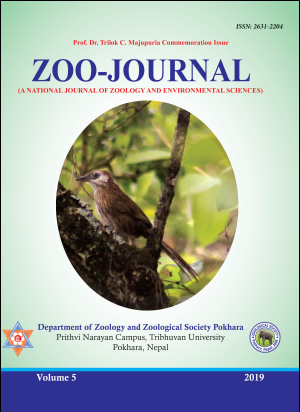Comparative Assessment of Water Quality in the Bagmati River Basin, Nepal
DOI:
https://doi.org/10.3126/zooj.v5i0.34919Keywords:
Surface water, physico-chemical parameters, quality monitoring, pollution, anthropogenic activities, KathmanduAbstract
Kathmandu, the capital city of Nepal is one of the most populated destinations of the country. The water pollution remains a challenging issue for the sustainable development in the valley despite several pollution control devices, awareness-raising and policy measures. During monsoon period 2018, surface water samples were collected from 10 sites of the Bagmati River and its tributaries within the valley to evaluate the water quality. The different physico-chemical parameters were determined to assess pollution along a 26.5 km stretch between Sundarijal Dam to Balkhu Bridge of the Bagmati River and its selected tributaries. The Electrical Conductivity (EC) ranged from 33-816μS/cm while turbidity ranged from 0.3- 981 NTU and Total Dissolved Solids (TDS) ranged from 16 to 612 mg/l. The ionic concentrations were higher in the lower sections where the population density is high compared to the head waters. The high value of TDS and low value of Dissolved Oxygen (DO) in the lower belts of rivers were due to large inputs of waste water, uncoordinated rapid urban expansion, inadequate waste water treatment facilities and organic loads caused by anthropogenic activities. A comparative study for the water quality variables in the urban areas showed that the main river and its tributaries were equally polluted. From water analysis, downstream sites showed contamination and comparatively polluted among the tributaries and Bagmati River. There is a need to take action plan against polluted site for sustainability of aquatic health of the riverine environment and to address the river for its longer life both by public and government sectors.
Downloads
Downloads
Published
How to Cite
Issue
Section
License
Copyright (c) 2019 Department of Zoology and Zoological Society Pokhara, Nepal

This work is licensed under a Creative Commons Attribution-NonCommercial 4.0 International License.
© Department of Zoology and Zoological Society Pokhara, Nepal

